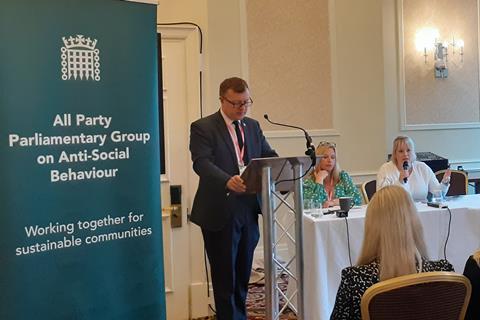Problem-solving housing courts should be piloted to tackle anti-social behaviour, an all-party parliamentary group has recommended - however, mixed feelings have emerged at the Conservative party conference on whether they will solve the problem.
A report published by the all-party parliamentary group on anti-social behaviour earlier this year recommended piloting the specialist courts to tackle anti-social behaviour and issues such as persistent rent arrears. Around 1.1 million incidents of anti-social behaviour were recorded in the year ending September 2022 - however, research by community safety group Resolve suggests the figures are much higher.
One housing court would be piloted in the West Midlands and another in a non-urban comparator. The report says a problem-solving court being introduced in Birmingham for female offenders - which can refer offenders into support services to treat issues fuelling offending, such as drink or drug addiction, or domestic abuse - offers a potential model.

Rebecca Bryant, chief executive of Resolve, told an APPG fringe event yesterday that the membership body lobbied for the recommendation.
Cases involving anti-social behaviour in the 'crumbling' civil justice system are taking 18 months to get to trial, Bryant said. 'Victims and communities are continuing to suffer throughout that period of time. The significant harm being caused must be recognised.'
Bryant was surprised to learn that anti-social behaviour training was not mandatory for judges. 'We're talking about the potential to send someone to prison, taking someone's home and making them homeless. The concept of consistency is really important. There is some really good case law but equally there are some bad decisions that have been made. The reasons behind that is because we do not have specialist training and support around this type of issue.'
A problem-solving approach would help change behaviour longer term, Bryant said. 'The way the system works means we're not having a holistic view around the individual and the family. Are we considering why someone is anti-social in the first place?'
However, Lisa Townsend, Conservative police and crime commissioner for Surrey, said another court system was not the answer to longer-term change. 'Courts do not create lasting change. As a Conservative, I really believe in localism.'
Townsend welcomed a pilot but said a problem-solving housing court was not the answer in Surrey. 'I do not want to see a top-down approach. I want to see local communities through PCCs, councillors, being able to take the approach that's right for them.'
This article is now closed for comment.



























8 Readers' comments